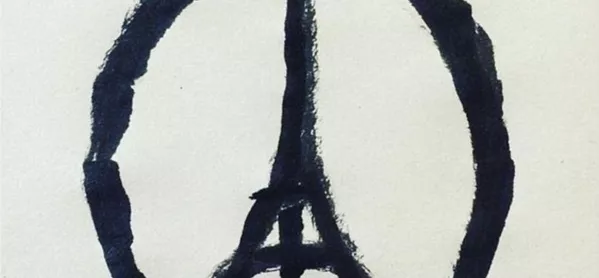Solidarity has come back into fashion, as both word and concept. But this time it’s global, and it’s happening right now, mostly on your Twitter timeline. There is no doubting the power and glory of #jesuischarlie, #ridewithme and #porteouverte, or the inspirational idealism of the Eiffel Tower peace symbol. But the euphoria they induce is sadly ephemeral.
Hashtags and icons come and go, wave after wave of them, like the atrocities to which they respond. At least #ridewithme and #porteouverte were grounded in practical action. But what we need is a more lasting engagement.
Now is surely the time to renew our commitment to the teaching and learning of French in our schools. France is our nearest neighbour but we have yet to meet the French halfway in terms of the effort we invest in mutual understanding. Just think for a moment of the countless compelling interviews we have listened to over the last few days, from French people of all ages and faiths, communicating in often impeccable, always expressive English. And we’re not talking about buying a baguette or booking a hotel room, but the impressive ability to articulate a world view, virtually under siege, live on television and radio.
This suggests that we need to set aside our superficially touristic approach to language and learn to live and breathe it instead, absorbing knowledge as much through lived experience as through any textbook or lecture. Language is in and all around us, part of our DNA, not something to be compartmentalised in 30-minute slots in the timetable. We need to think in terms of “total learning”, in the way that athletes speak of total training, with no Cartesian divide between body and mind. And if I had my way, a year - or at least a term - abroad in a second-language country would be made compulsory. Now that would be an entente cordiale to be proud of.
The point of studying French is not to promote French culture in the narrow sense. So when we pick up a book by Albert Camus or read about Zinedine Zidane, we should also talk about what it means to be exiled from Algeria and settle in France. We need to listen to Mali’s Amadou and Mariam or Toumani Diabaté alongside Debussy and Ravel. French culture, just like British, is intrinsically multicultural. Nevertheless, the essentials remain the same.
Take a random stroll through the streets of Paris and it won’t be long before you see the words “Liberté, Égalité, Fraternité” emblazoned on a lintel, usually above the entrance to a school. The democratic aspirations encapsulated in these words are still broadly those we choose to live by today. France gave America the Statue of Liberty, built by Gustave Eiffel and partially inspired by the figure of Marianne, an allegorical embodiment of the French Republic symbolising liberty and reason. Its ideals and conflicts are our own. We need to work together to keep those intellectual and spiritual borders open.
When I was three, my family sailed from Australia to France in the SS Oriana. I spent two years at an École Maternelle in Aix-en-Provence, thanks to which I know that the rustic precursor of the melt-in-the-mouth pain au chocolat was originally a stick of dark chocolate in a hunk of baguette. I learned to sing “Marlbrough s’en va-t-en guerre” and received a crash course in hyphens and apostrophes. Later, aged 13, I lived in Paris and went to the CES Henri Barbusse in Issy-les-Moulineaux, where I studied French grammar, as well as Latin, Greek and German, and won a prize for reciting Guillaume Apollinaire’s Le pont Mirabeau. I developed a French alter ego and became a linguist, one of those professions that almost axiomatically attracts the word “passion” and where there is little distinction between the job that you do and the life that you live.
Part of me would like to present this blog as an Eiffel Tower-shaped calligram, in the style of Apollinaire. It would have instant impact and serve as a pretty compliment to the city I love. But I’m going to resist temptation, not least because the technical trick is beyond my digital skills. The emotional high of the hashtag ride is the educational equivalent of the holiday romance. Learning a language, on the other hand, is a commitment for life. Paris, je t’aime.
Dr Heather Martin is a languages specialist and tweets at @drheathermartin




